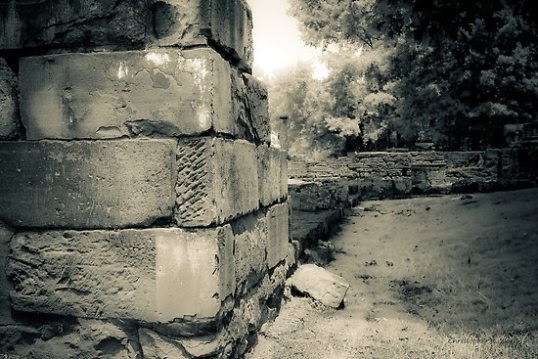The stone which the builders rejected became the very cornerstone. Psalm 118.22 (I Peter 2.7)
A stone of stumbling and a rock of offense....Isaiah 8.14 (I Peter 2.8)
In I Peter 2.4-10 the apostle tells us there are two ways of rejecting Jesus: to reject Him after consideration, and to overlook Him altogether and stumble. Both are fatal.
The larger passage begins in 1.22 where Peter reminds us that we mortals have been given immortality since our souls have been “purified.” He continues in Chapter 2.1 to tell us that since this is the case we have to move forward and build a new life. We must put away old habits and like “newborn babies, long for the pure milk of the world.” In 2.4 he tells us that we begin building this new life by laying a cornerstone. A cornerstone sets the line for all three dimensions of the house we are to build, and establishes as well the soundness of all the construction that follows. We receive a cornerstone from God Himself, Peter reminds us (2.6, quoting from Isaiah 28.16). This stone is “carefully chosen,” and “precious.” Of course the cornerstone is not an actual stone, it is a “Him” (v. 4) - it is Christ. In verse 7 he tells us that only those who believe will perceive the value of the stone. Those who do not believe can be divided into two categories: those who consider then reject the cornerstone, and those who overlook it and take a tumble.
Peter then quotes the two Old Testament passages cited above. In verse 7 he quotes Psalm 118.22, which states that the chief cornerstone was rejected by the builders. Some will truly consider all that Jesus teaches and reject Him anyway. In verse 8 he quotes Isaiah 8.14 which describes the stone as a cause of “stumbling,” and “offense.” These two words are interesting. The word translated “offense” is the same word translated “stumbling block” in I Corinthians 1.23. It originally described the tripwire or spring of a trap. The word “stumbling” describes tripping over a stone or impediment in the road. Both words describe the unexpected – the surprise that causes a fall. Some will completely disregard Jesus to their own demise.
In the New Testament we see Jesus rejected in both ways. Some consider Him carefully and say, “This is not the Messiah we’re looking for.” The various groups which made up the religious establishment in Jesus’ day - Pharisees, Sadducees, Scribes, experts on the law, the priesthood - all rejected him in turn, after investigation.
Others – Pilate, Herod, even Saul before his conversion (see I Timothy 1.13), overlooked Jesus. Their unbelief was a result of willful ignorance.
Which rejection is worse? One could argue that to really examine the evidence and then reject Him is unthinkable. Only a truly obdurate and rascally person would do that. One also might argue that showing no interest in the truth at all is a greater act of disrespect than learning it and rejecting it.
Rejecting the stone either way results in downfall. To discard the one true cornerstone for something inferior is to build a house that will not stand. To disregard the stone is to stumble over it to our own destruction.
We recognize more readily the former. Those who name Jesus and reject Him are more visibly opponents of the Gospel. But any of us who go through an hour, a day, a year, a lifetime without giving Him any serious thought (although we may give Him a lifetime of lip-service), have rejected Him just as thoroughly. Our demise will be thorough as well.
The passage concludes by reminding us who we are. Quoting Deuteronomy 10.15, and Hosea 1.9-10, Peter reminds us we: a chosen race, a royal priesthood, a holy nation, a people for God’s own possession. We once were “not a people,” but now are the very people of God. Once we “had not received mercy,” but now we have. This is a lot to consider, and accept. Let us do both – every day.


